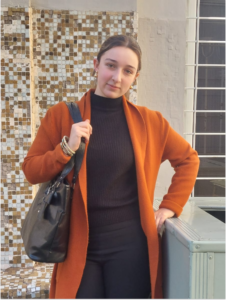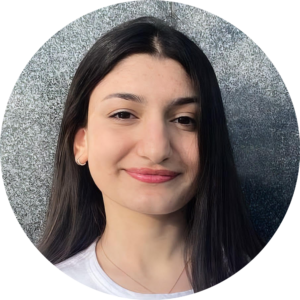17-year-old Anita Stepanyan explains how a project in Argentina is teaching the language and culture of the Guarani

Members of the Guarani language class, UNNE, Argentina.
Picture by: Guistina Gallardi
Article link copied.
28 March 2025
‘New Speakers’: Trying to save an indigenous South American language from extinction
The indigenous South American language Guarani is on the brink of extinction, but the New Speakers project run by the Universidad Nacional del Nordeste (UNNE) in Argentina aims to revitalise it. Giustina Gallardi, 18, from Corrientes, has joined the project to learn Guarani, with the hope of deepening her connection to her culture, her environment and herself.
“Indigenous languages and culture offer a new perspective, one that connects us with the earth and with each other,” Gallardi said. “Also, in Corrientes, it’s common to hear some Guarani words mixed into everyday conversation. This is why I am learning Guarani – to connect with my roots and reflect on those values.”
Harbingers’ Weekly Brief
An endangered language
Guarani is a pre-Colombian language spoken by the indigenous tribe of the same name. The Guarani inhabit an area spanning the south of Paraguay, the north-east of Argentina, and the south-west of Brazil. The language is spoken by people across South America, and is the dominant language in Paraguay, over Spanish.
However, Guarani is not widely spoken in Argentina due to its negative associations within the country. Even though the Argentine Constitution, enacted in 1853, guarantees citizenship to anyone born on Argentine soil (jus soli), this has not always been fully applied to indigenous populations. Over the years, this has led to persecution, abduction, and forced labour without compensation, which further impeded the language’s popularity.
“The language was nearly eradicated in daily life, and it was almost forbidden to speak Guarani. With each passing generation, fewer and fewer people spoke the language,” Gallardi explained.
Professor Elba Rios, the only Guarani language teacher at UNNE, says that the social challenges faced by the Guarani community worsened the preservation of the language. She explains how the stigma associated with it triggers a generational interruption – it terminates the transmission of Guarani and the related ancestral knowledge of the culture within families.
New Speakers project
The New Speakers (Nuevos Hablantes) project is run by the modern foreign languages departmentof UNNE in Corrientes, and is open to students and the general public.
The goal of the project, introducedlast year, is not only to teach students how to read and write in the Guarani language, but mainly to teach them how to speak it. Currently, there are more than 20 students learning Guarani.

Guistina Gallardi, 18, is learning Guarani.
Picture courtesy of: Guistina Gallardi
Students are taught the language by Professor Rios, while other professors cover anthropology and sociology issues, such as the social challenges faced by the Guarani people, and their ancestral trades and knowledge.
It is important to note that Professor Rios belongs to the Creole population that speaks Guarani and identifies herself as Guarani. The main reason for her participation in a project is her interest in the vitality of her language and culture.
Gallardi says learning Guarani “as more than just homework”, but “something to connect with,” which makes the process much more enjoyable. Her favourite part is talking with her classmates: ”Despite the large age gap – I’m 18, and one of my classmates is 68 – we can communicate, understand each other, and have fun together. In those two hours, we are equals. For me, that’s a fantastic experience.”
Cultural wealth and new perspectives
Gallardi says: “Guarani is spoken in a large region of Latin America, both by native and Creole populations, it has a great deal of ancestral knowledge and cultural wealth and it continues to be the mother tongue of people who are still alive.”
Guarani culture is deeply connected to nature and involves a profound respect for the earth, where their ancestors lived. “They have the knowledge of how to use the earth without abusing it. This perspective is so different from what we are accustomed to today. The Guarani way of life is rich in culture and connection with nature, and I believe we need to return to these principles, especially in these times when climate change is a serious threat to our survival,” Gallardi said.
Professor Rios explained that everything recorded in the New Speakers project could be valuable to other communities speaking languages at a risk of extinction: “The prospects are promising, with emerging awareness from the provincial government and increasing interest from the university, which could signal greater societal involvement.”
Written by:

Writer
Yerevan, Armenia
Born in 2007 in Stepanakert, the capital of Artsakh, Anita Stepanyan was displaced to Armenia in the autumn of 2023 and is now studying in Yerevan, the capital of Armenia. She is interested in music and history and plans to study at the Yerevan State Medical University.
Anita is part of Harbingers’ Magazine’s Armenian Newsroomand writes about the history of small-numbered nations and countries, focusing on their languages, cultures and traditions.
In her free time, she enjoys music and reading, and she has graduated from music school.
Anita speaks Armenian, Russian, and English.
Edited by:

🌍 Join the World's Youngest Newsroom—Create a Free Account
Sign up to save your favourite articles, get personalised recommendations, and stay informed about stories that Gen Z worldwide actually care about. Plus, subscribe to our newsletter for the latest stories delivered straight to your inbox. 📲
© 2026 The Oxford School for the Future


